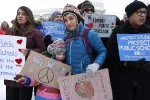Betsy DeVos' unwavering support of private school vouchers long precedes her tenure as U.S. Education Secretary. Despite being supported by the resources and influence of the federal government, however, DeVos' efforts to expand vouchers legislatively have been stymied by lack of support in Congress (even when the GOP held majorities in both houses) and stubborn public opposition. American voters have rejected programs that transfer scarce taxpayer dollars away from public schools to pay for private school tuition.
For champions of school privatization, there is too much at stake, too much money invested in the school privatization agenda to wave the white flag. Which is why the push to expand vouchers is also being waged in the courts.
“Taxpayers and voters have made it overwhelmingly clear that they do not want vouchers, rejecting them time and time again," said NEA President Lily Eskselsen García. "Betsy DeVos and her allies are using the Supreme Court to push their political agenda that seeks to dismantle our neighborhood public schools."
Through a series of legal actions, the Institute for Justice (IJ) - whose funders have included the Koch Brothers and the DeVos Family Foundation - have targeted provisions in state constitutions that forbid public money being used for religious purposes, including private religious schools.
On January 22nd, the U.S. Supreme Court heard arguments on whether these provisions violate the U.S. Constitution. A decision in IJ’s favor in Espinoza v Montana Department of Revenue could undermine constitutional provisions in 37 states that prevent money from flowing to private religious schools, opening the door to more voucher programs.
In 2017, voucher proponents hoped to obtain such a decision in Trinity Lutheran Church of Columbia, Inc. v. Comer, which centered around state-funded playground resurfacing grants. The Court ruled that a state could not withhold a grant to a church solely due to the fact that the church is a religious institution. But in the narrowly-written opinion, the Court made it clear it was not “address[ing] religious uses of funding or other forms of discrimination.”
The ruling was setback for the IJ, who hoped the Court would use Trinity to also strike down state constitutional barriers to school vouchers. Instead, the organization regrouped and put together another case that, by focusing specifically on a state voucher program, raises the stakes significantly.
Taxpayers and voters have made it overwhelmingly clear that they do not want vouchers, rejecting them time and time again. Betsy DeVos and her allies are using the Supreme Court to push their political agenda that seeks to dismantle our neighborhood public schools." - NEA President Lily Eskelsen García.
At issue in Espinoza is a tax credit for private school tuition passed by the Montana legislature in 2015. Similar to programs implemented in other states, the Montana program hands out tax credits to individuals who donate to private-school scholarships.
Carl Davis of the Institute for Taxation and Education Policy calls these and similar programs “neo-vouchers” because they still, albeit through a more circuitous route, transfer taxpayer money to private schools. They simply manipulate tax codes "into a tool for funding private and religious schools with public dollars,” Davis said.
Because it allows families to use tax credit funds to pay for attendance at religious schools, Montana's highest court ruled that the program violated the state constitution's ban on state aid to religious organizations and struck down the program in its entirety. The plaintiffs appealed the ruling to the U.S. Supreme Court, which agreed to hear the case in 2019. (In November, the National Education Association filed an amicus brief arguing the case lacked legal merit and should be thrown out entirely.)
Depending on the outcome, Espinoza could have a wide-ranging and potentially devastating impact on public education across the country.
"The Institute for Justice and its who’s-who of right-wing donors want to careen this case down a slippery slope," writes David Dayen in The American Prospect. Taking an extreme view, Dayen argues that "[i] f you enable a state tax credit that funds a student attending religious school, you also have to give equal parity in all funding to public and private religious schools. That would siphon off large parts of education budgets."
And even if the ruling would not usher in such a sea change, at the very least, the IJ hopes that a ruling in its favor will turn from permissive to mandatory a state’s decision to include – or not – religious schools in state school voucher programs.
The plaintiffs have invoked the free exercise of religion to make their case that the Montana's court ruling should be overturned. But First Amendment arguments have served as a convenient smokescreen in previous legal assaults on public education, and Espinoza is no different.
The dire consequences of a secretary of education leading the charge on school privatization and a federal judiciary being littered with sympathetic right-wing judges offer a resounding lesson, Eskelsen García said.
"Cases like Espinoza clearly illustrate what's at stake. Elections have consequences. 2020 presents us with the opportunity to stop this systematic attack on our public schools."





